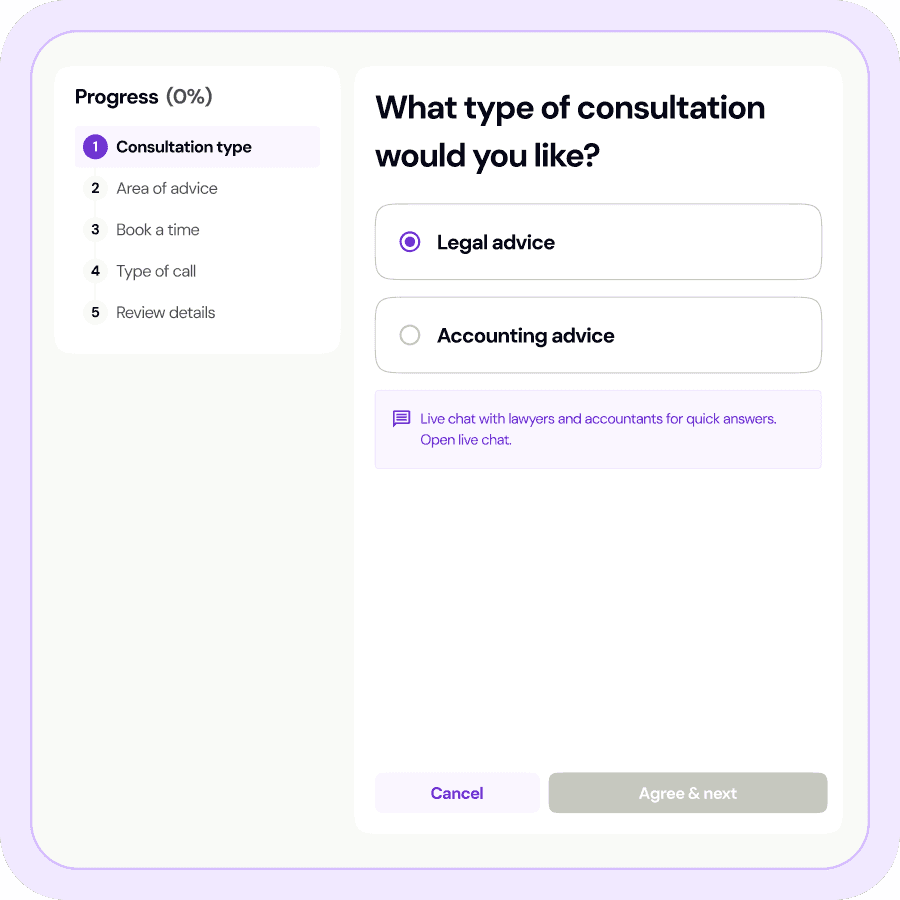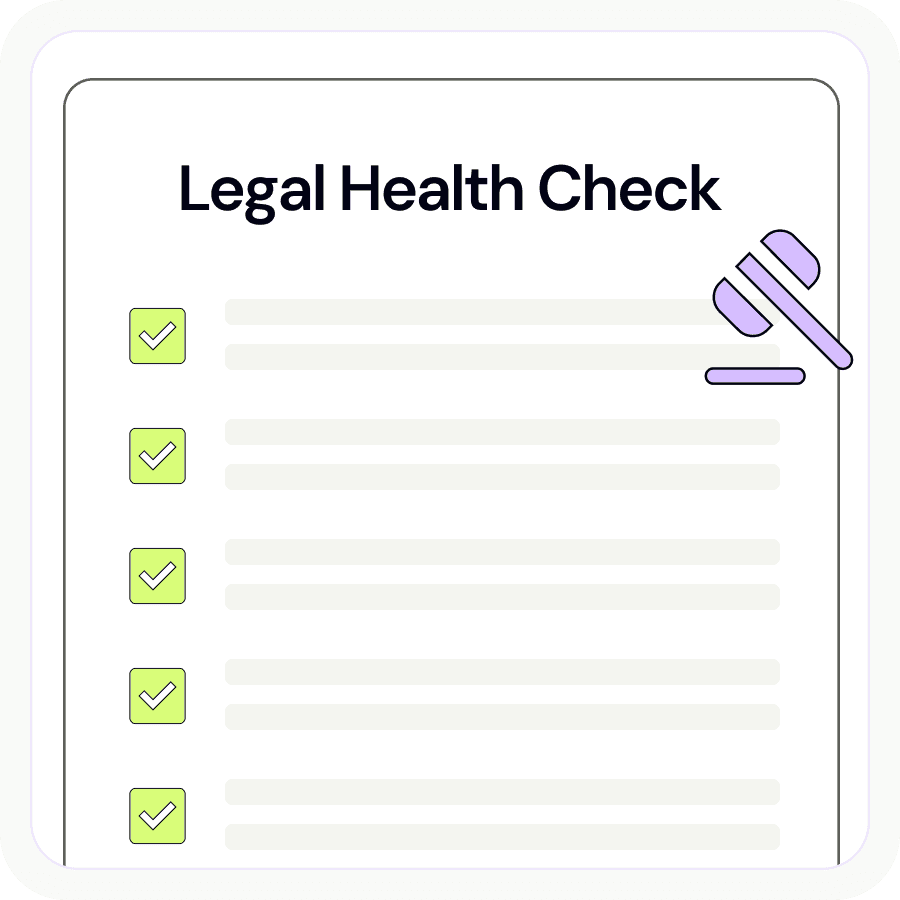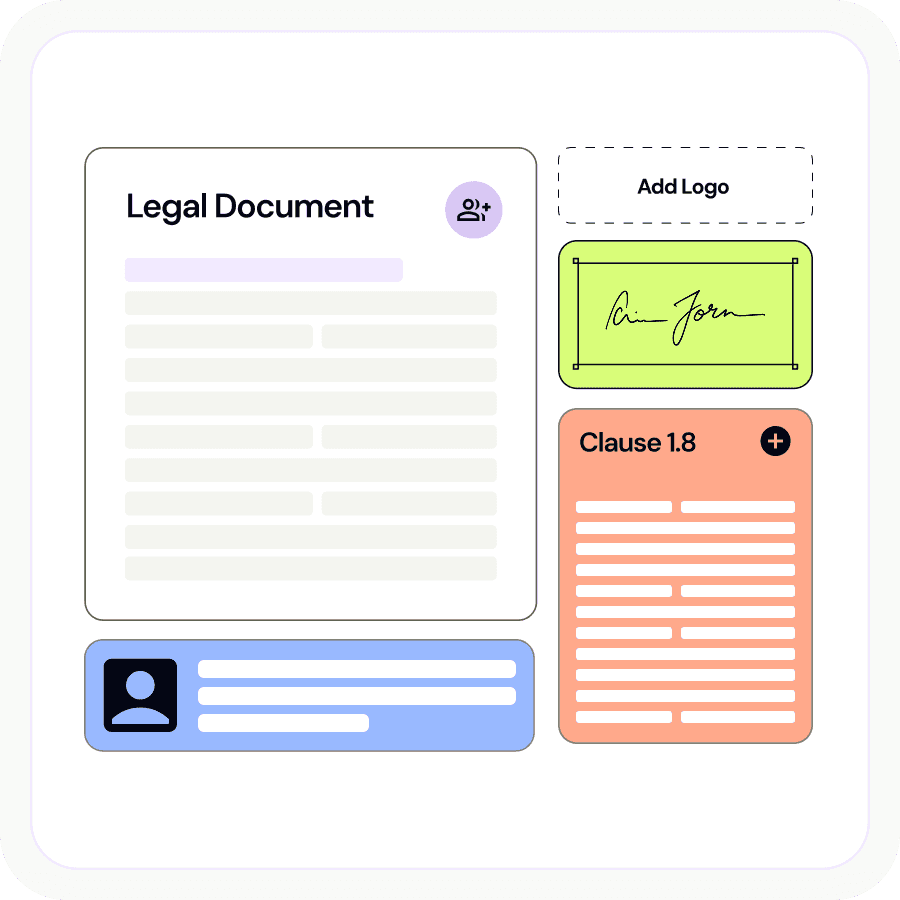To start a not-for-profit (NFP) in Australia, you’ll have to navigate a complex legal landscape, where having the right legal documents is essential to operate safely, compliantly, and with public trust. For many aspiring not-for-profit leaders, understanding which legal documents are necessary can be overwhelming, especially with the regulatory requirements imposed by bodies like the Australian Charities and Not-for-profits Commission (ACNC).
This guide will walk you through the key legal documents you need to establish and run a not-for-profit organisation in Australia. We’ve included the purpose and importance of each document, along with practical guidance on compliance, so you can confidently set up your not-for-profit and maintain its good standing.
Table of Contents
Why NFPs need legal documents to operate safely and compliantly
Not-for-profits are special entities, often entrusted with public funds and community goodwill. To maintain this trust, it’s essential to manage governance effectively, comply with regulatory standards, and avoid breaching ACNC’s governance rules.
Legal documents are the backbone of this compliance framework. They clarify roles, responsibilities, and processes, helping you protect the organisation’s mission, its people, and its financial resources.
Without proper documentation, your not-for-profit risks mismanagement, loss of funding, and even deregistration. Navigating these complexities with the right legal paperwork ensures your not-for-profit can focus on its purpose while meeting legal obligations.
Understanding different NFP structures and their legal requirements
Not-for-profit organisations in Australia can take various legal forms, each with distinct governance and compliance needs.
- Incorporated Associations: These are typically smaller, community-based groups governed under state or territory legislation. They require a constitution or set of rules tailored to state laws.
- Companies Limited by Guarantee: Registered under the Corporations Act 2001 (Cth), these are suited for larger or national organisations and require a constitution compliant with federal law.
- Unincorporated Associations: These NFPs are less formal structures that may have simpler rules but limited legal protections.
Additionally, it’s important to remember that not all NFPs are charities.
Charities must meet specific criteria and register with the ACNC. They are also subject to additional governance standards and reporting requirements, which influence the legal documents they must maintain.
Key legal documents for different Australian NFP structures
Below are the essential legal documents that form the foundation of a compliant and well-governed Australian not-for-profit.
Incorporated Associations
Formation documents
Incorporated associations are governed by state or territory legislation and must have a set of rules or a constitution that complies with the relevant incorporation act (e.g., Associations Incorporation Reform Act 2012 in Victoria). For example, here is a constitution template for NSW.
This document outlines the organisation’s purpose, membership eligibility, meeting procedures, and governance arrangements. It is essential for registration with the relevant state regulator and for ACNC charity registration if applicable.
- The constitution or rules must cover specific matters required by the state law, such as member rights, committee management, and dispute resolution.
- Incorporated associations must include “Incorporated” or “Inc.” in their name.
Governance and compliance documents
- Record and share Annual General Meeting (AGM) notices and minutes as per legal requirements.
- Maintain financial records and reports as per state requirements.
- Policies such as Conflict of Interest and Complaints Handling are recommended and mandatory if the association is a registered charity with the ACNC.
Companies Limited by Guarantee (CLG)
Formation documents
A CLG is incorporated under the Corporations Act 2001 (Cth) and requires a constitution compliant with federal law. This constitution sets out the company’s objects, member rights, governance structures, and limitations on the distribution of profits.
- The company name must include “Limited” or “Ltd” unless exempted by ASIC for ACNC-registered charities with appropriate constitution clauses.
- Directors must obtain Director Identification Numbers (DINs) before appointment.
Governance and compliance documents
- Consent forms for officeholders and members
- Register of members and officeholders
- Annual General Meeting notices and minutes, held within five months of the financial year-end
- Financial declarations and registers of related party transactions and interests
- Conflict of Interest and Complaints Handling policies are mandatory for CLGs registered as charities with the ACNC.
- Governance Standard 4 Declaration confirming the suitability of responsible persons is required for ACNC-registered charities.
Unincorporated associations
Formation documents
Unincorporated associations are informal groups without a separate legal status. While not legally required, it is strongly recommended to have a written statement of objectives or rules that clearly describe:
- The group’s purpose and objects
- Membership criteria and obligations
- Decision-making processes
- Risk management and liability considerations for members
Governance and compliance documents
- Due to their informal nature, unincorporated associations do not have mandatory governance documents but benefit from clear policies on conflict of interest and complaints to reduce risks.
- They cannot hold property or enter contracts in the association’s name, which limits operational capacity.
Charity-specific document requirements
Not all NFPs are charities, but those that register with ACNC must comply with additional governance standards, including:
- A constitution or rules that meet ACNC requirements.
- Conflict of Interest Policy
- Complaints Handling Policy
- Governance Standard 4 Declaration for responsible persons
- Annual reporting including financial statements and AGM documentation
These documents ensure transparency, accountability, and compliance with ACNC regulations, which differ from general NFP obligations.
Lawpath provides hundreds of professional and legally-sound templates for NFPs, to help you quickly start your charity and run it smoothly.
“The templates — there are thousands of legal templates available. You just type in whatever you need in the search bar, and the template comes up. You fill in the blanks, you put in your logo, and it spits out a really professional-looking document within seconds. You just save hours. It just makes good sense as an entrepreneur when you don’t have a legal team, you don’t have the funding to do legal, but it’s important.” – Isabella van Nuissenburg, Founder and CEO of SilentSOS
NFP compliance, governance, and finance documents explained
Compliance and transparency documents
Trust and transparency are crucial for NFPs. Here is a set of documents that will help you communicate your NFP’s work with stakeholders and the government.
Conflict of Interest Policy
A conflict of interest policy is mandatory for most charities and not-for-profits. This document ensures transparency in decision-making by requiring board members and staff to disclose any personal interests that could influence their impartiality.
By managing conflicts of interest, the policy protects the integrity of the board and the organisation’s reputation, helping to maintain public trust and comply with ACNC governance standards.
Complaints Handling Policy
The complaints handling policy provides a structured and fair process for addressing complaints from stakeholders, donors, beneficiaries, or the public.
A well-drafted complaint policy helps your NFP respond promptly and appropriately to concerns, reducing the risk of legal disputes and reputational damage. It also demonstrates accountability and commitment to ethical practices, which are vital for ongoing community support and compliance.
Letter of Appointment for Responsible Person
The letter of appointment for responsible person formalises the roles, duties, and expectations of board members or key management personnel. It clarifies responsibilities, time commitments, and legal obligations, helping to ensure that responsible persons understand their governance duties under the ACNC’s standards.
This document supports good governance by setting clear terms for leadership roles.
Notice and Minutes of Annual General Meeting (AGM)
Annual General Meetings are a legal requirement for most not-for-profits and are essential for transparency and accountability. Properly documented notices and minutes of AGMs record important decisions, financial reports, and board elections.
These documents are often required for ACNC reporting and demonstrate that your organisation adheres to its governance obligations, fostering stakeholder confidence.
Governance Standard 4 Declaration (Charities Only)
Under the ACNC’s Governance Standard 4, charities must confirm the suitability of their responsible persons (such as directors or committee members).
To do so, you must submit the Governance Standard 4 Declaration, which verifies that individuals are not disqualified from managing a corporation due to criminal offences or other reasons.
It is a critical compliance step to ensure that your board members meet the ‘fit and proper person’ criteria, protecting the organisation from governance risks.
Financial documentation
You will also need to meticulously manage your organisation’s finances. The documents listed below can help you do so effectively and compliantly.
Financial declaration
A financial declaration is a formal statement confirming the accuracy and integrity of your organisation’s financial reports. It is typically signed by responsible persons, such as the treasurer or board chair, to affirm that the financial statements present a true and fair view of the organisation’s financial position.
Register of related party transactions
The register of related party transactions records any financial transactions between your not-for-profit and its board members, key personnel, or associated parties. Maintaining this register is crucial to ensure transparency and prevent conflicts of interest, as it allows the organisation and regulators to monitor dealings that could influence decision-making.
Register of interests
The register of interests tracks any personal, financial, or other interests held by board members and key management personnel that could conflict with their duties. This document is a key tool for managing conflicts of interest proactively, ensuring that decisions are made in the best interests of the organisation.
Board and leadership documentation
In addition to finance and transparency, the people behind your not-for-profit are essential points in the trustworthiness of your organisation. The documents below serve to ensure transparency regarding your leadership team.
Details of Responsible People
The details of responsible people document maintains up-to-date records of all responsible persons involved in your organisation’s governance, including board members and key management personnel.
Accurate records are essential for ACNC reporting and help demonstrate that your organisation meets the ‘fit and proper person’ requirements under Governance Standard 4.
Register of interests (for Board and Leadership)
As noted under financial documentation, the register of interests is also critical for leadership governance. It ensures that all responsible persons disclose relevant interests, helping to manage potential conflicts at the governance level.
Rules for incorporated and unincorporated associations (NSW, VIC)
If your NFP operates as an incorporated or unincorporated association in states like New South Wales or Victoria, it must comply with specific local legislation. These rules govern how your organisation operates, including membership, meetings, and dispute resolution.
Having a clear set of rules tailored to your state’s legal requirements ensures your organisation remains compliant with regional laws and supports effective governance at the local level.
Lawpath provides free templates for these documents:
Quick reference table: Essential legal documents for Australian not-for-profits
Below is a summary table of all the key documents discussed in this article. Use this as a checklist to ensure your NFP is well-equipped for compliance, good governance, and financial transparency.
| Document Name | Purpose | When/Why It’s Needed | Applicable NFP Structures (Required / Recommended) |
| Constitution (Incorporated Association or Company Limited by Guarantee) | Outlines governance structure, purpose, and operational rules | Required for registration with ACNC and regulatory bodies | Required for Incorporated Associations and Companies Limited by Guarantee |
| Conflict of Interest Policy | Manages and discloses personal interests affecting decisions | Mandatory for most charities; protects board integrity | Mandatory for ACNC-registered Charities; Recommended for all NFPs |
| Complaints Handling Policy | Provides a fair process for addressing complaints | Essential for stakeholder trust and legal soundness | Mandatory for ACNC-registered Charities; Recommended for Incorporated Associations and Companies Limited by Guarantee; Suggested for Unincorporated Associations |
| Letter of Appointment for Responsible Person | Formalises duties and expectations of board/key personnel | Used when appointing board members or management | Recommended for all incorporated structures (Incorporated Associations, CLGs); Optional for Unincorporated Associations |
| Governance Standard 4 Declaration | Confirms suitability of responsible persons | Required by ACNC for board/committee members | Mandatory for ACNC-registered Charities (both Incorporated Associations and CLGs) |
| Notice and Minutes of AGM | Records official decisions and annual reporting | Required for annual meetings and transparency | Required for Incorporated Associations, Companies Limited by Guarantee, and ACNC-registered Charities |
| Financial Declaration | Confirms the accuracy of financial statements | Supports audit readiness and funder confidence | Required for ACNC-registered Charities; Recommended for Incorporated Associations and CLGs |
| Register of Related Party Transactions | Tracks transactions with board members or related parties | Ensures transparency and prevents conflicts | Required for ACNC-registered Charities; Recommended for Incorporated Associations and CLGs |
| Register of Interests | Records interests of board and key personnel | Manages conflicts and supports compliance | Recommended for Incorporated Associations and CLGs; Suggested for Unincorporated Associations |
| Details of Responsible People | Maintains up-to-date records of board and key personnel | Required for ACNC reporting and governance | Required for Incorporated Associations, Companies Limited by Guarantee, and ACNC-registered Charities |
| Rules for Incorporated/Unincorporated Associations (NSW, VIC, etc.) | Ensures compliance with state-specific legislation | Required for local legal compliance | Required for Incorporated Associations; Recommended for Unincorporated Associations (to clarify governance) |
Make compliance easy with legal templates for NFPs
Lawpath offers a comprehensive suite of legal templates tailored specifically for Australian charities and not-for-profits. These templates save time and reduce the risk of errors by providing ACNC-aligned language and structures.
“Getting an annual membership with Lawpath just makes sense. It allows you to continue progressing and having all the paperwork and legalities in place so you’re ticking all the boxes.” – Isabella van Nuissenburg, Founder and CEO of SilentSOS
Many templates feature automated document creation, making it straightforward to customise documents to your organisation’s needs.
Additionally, access to lawyer support ensures you can get expert advice when required, simplifying the compliance journey and empowering your not-for-profit to focus on its mission.
What’s the difference between an incorporated association and a company limited by guarantee?
FAQ
An incorporated association is usually suited for smaller, community-based not-for-profits and is governed by state or territory laws. Meanwhile, a company limited by guarantee is registered under federal law and better suited for larger or national organisations.
Both require a constitution but differ in regulatory frameworks and reporting obligations.
How do I appoint a board member for my not-for-profit?
Typically, board members are appointed through a formal process outlined in your constitution, often involving nomination and approval at a general meeting. A letter of appointment should then be issued to clarify their roles and responsibilities.
Managing a compliant NFP
Starting a not-for-profit in Australia requires careful attention to legal documentation to ensure compliance, protect your organisation, and maintain public trust. From constitutions to governance declarations, each document plays a vital role in your not-for-profit’s success.
Lawpath offers tailored legal document templates to simplify this process, providing peace of mind and allowing you to focus on making a positive impact.
Take the first step towards compliant and confident NFP governance today with Lawpath.










